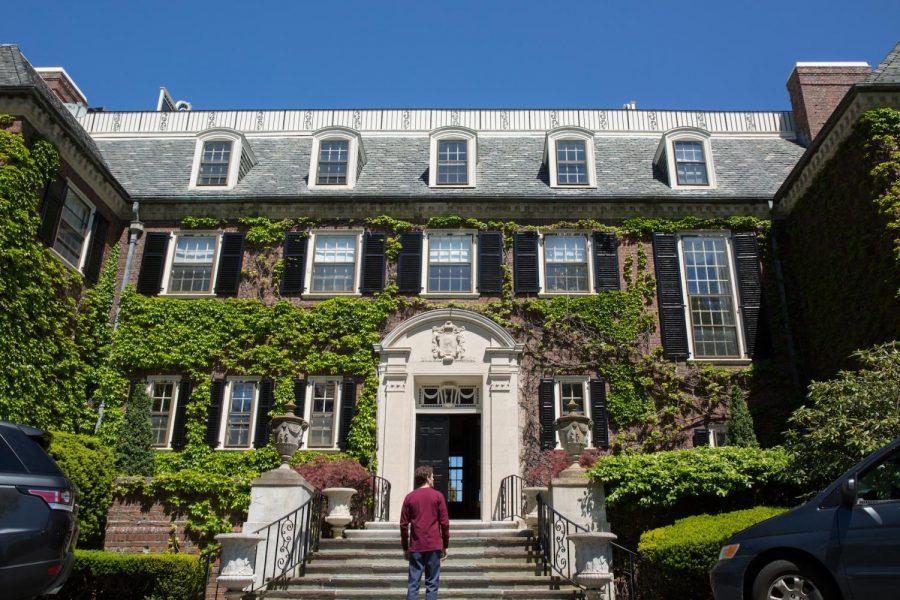Q&A: ‘Thoroughbreds’ Director Cory Finley
Tim, played by Anton Yelchin, at the set of ‘Thoroughbreds’. Director of the film, Corey Finley, sat down with WSN to talk about his new movie release
March 9, 2018
Joining the ranks of young, modern directors like Jordan Peele (“Get Out”) and Destin Daniel Cretton (“Short Term 12”) is playwright-turned-writer and director Cory Finley. “Thoroughbreds” was adapted from an unproduced play of his own and brought to the big screen with the help of a young, talented cast that includes Anya Taylor-Joy, Olivia Cooke and the late Anton Yelchin.
WSN had the opportunity to talk with Finley over the phone about the release of his film, his process of taking a play to the theaters and his experience working with Anton Yelchin on one of his last performances.
Washington Square News: As an NYU student, I have grown very familiar with the world of rich kids from suburban Connecticut. What experiences did you draw on while writing this story that informed the world you built?
Cory Finley: I definitely knew some very wealthy kids from my high school, college – I even have sort of very specific memories of going over as a little kid to a friend’s house and they had these giant mansions and being kind of pulled into a reverie by the beauty of everything, the quietness and the lushness and everything; the way you sort of get lost in these homes … And the movie, which started initially as a play, was a way for me to delve into my complicated feelings about wealth, because I was always sort of hypnotized by it growing up, and obviously as I got older I started to think about how someone’s wealth is always built on someone else’s loss, in this kind of zero-sum capitalism that we live in.
WSN: Without giving too much away, much of the film’s climax plays out in a very tense, long static shot that stays in one room, mostly separate from the action – and it works brilliantly. What factored into that choice and did you ever have any doubts about it?
CF: I had a lot of doubts; I definitely got cold feet on the day of shooting because it takes forever to play out. There is a quick change in the shot, where she actually leaves the room, quick changes and leaves the room, and it takes a long time to play out. I was nervous people would lose interest. But once we had the final sound design, it’s wonderful to see how an audience would just kind of lean in when you had silence and stillness. Not all the time – obviously you can’t do it the whole movie – but I do think it’s an underused tool.
WSN: You premiered this film at Sundance 2017. Between the Sundance premiere of the theatrical release of your film, there’s been another Sundance and the world has changed considerably – how has that felt: the waiting period between premiere and release? And what have you been working on in the interim?
CF: Well, yeah I’m naturally a very anxious person, so it’s a lot of anxiety, but the best thing about it is that it’s given me time to develop other projects, and tour the movie around and take it to different festivals. It’s a fun movie to see people’s different reactions to it. But always, when you’re making a movie, it’s such a slow means of production, and editing and distribution, you’re always sort of hoping it’s gonna resonate the way that you want it to in the future. I feel good about the messages in the movie, it’s trying not to be a didactic one. I hope it’s engaging with interesting questions but not preaching. I think it’s the preaching movies that age poorly.
WSN: Your lead actresses, Anya Taylor-Joy and Olivia Cooke are both tremendously talented and have some seriously big movies coming out soon (Taylor-Joy reprising her role from “Split” in M. Night Shyamalan’s upcoming “Glass,” and Olivia Cooke, starring in Steven Spielberg’s upcoming “Ready Player One”). Can you describe what it was like working with a young cast possibly just before they breakout more than they already have?
CF: It was really cool; it helped us get the movie made. People in the industry were very aware that these were actresses to watch, so their attachment to the project made it a real thing. They’re both super talented, it’s going to be fascinating to see where their careers lead; their careers have both developed in awesome, fascinating ways – even since I’ve worked with them. I was a first-time director, so it was good to have a cast that was young and not jaded about their work.
WSN: Obviously, the late Anton Yelchin had a big role to play in this film and watching him in it is both bittersweet and hilarious, because he’s so good. What are some of the fondest memories you have from working with him?
CF: The whole experience was really amazing. As soon as he came on board, we had a great dinner, where we talked about film noir as a genre. He was very keyed into that aspect of this movie, he loved film noir. I felt really, like I knew nothing about movies, talking to him. He was also the sweetest guy, he would never make you feel less-than for not knowing these things. He was just delightful and funny from the beginning, he was awesome throughout and brought a jolt of energy. The first time he was acting with the two leads, it was like a shot of coffee to the set … I think it plays really beautifully with the kind of more reserved performances of the leads.
“Thoroughbreds” opens in theaters this Friday, March 9.
Email Tyler Stevens at [email protected].


























































































































































